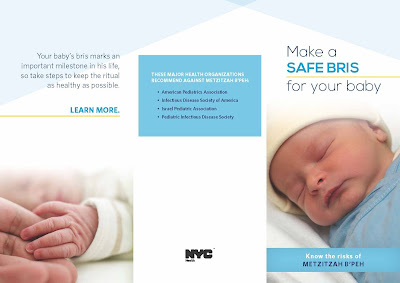 |
Brochure highlights danger of oral-gential contact during ritual circumcision but laws are needed to protect vulnerable babies. |
By REBECCA WALD
One topic I’ve never before addressed on Beyond the Bris is the practice of metzitsah b’peh. This very ancient practice takes place during traditional religious circumcision, just after the mohel has removed the foreskin.
Before this practice was in the news because of infants contracting herpes, and long before I was involved in the genital autonomy movement, the way I had always understood the practice—the way it must have been described to me at some point during my childhood (not by my parents)—was as a brief “washing” of the circumcision wound with wine that the mohel (ritual circumciser) took into his mouth.
I think my initial reaction to this information was that it was an odd thing to do, a throwback to olden days before antiseptic, and possibly even clever—how smart to use a bit of alcohol to cleanse the wound when nothing better was available. I don’t remember such a conversation actually taking place, but I can almost imagine someone saying something like: “Yeah, it’s a bit weird but they didn’t have antiseptic back in those days, so this was a way to cleanse the wound so it didn’t get infected. It’s just one of those quirky traditions that has carried on through the years.”
Incredible that when we are exposed to cultural practices as children we tend to accept them with little thought. I know this was the case for me and this odd “washing with wine” as I understood it. Coming from a more progressive Jewish background, I didn’t know the specific name. (In fact this practice is prescribed in the Talmud as a health measure to draw blood away from the wound.)
Today as I read about metzitsah b’peh in the news, it’s always emphasized that this is only done by a very small sect of ultra-religious Jewish people (a small percentage of a small percentage) but as I look back to before the practice was making headlines, I question whether it was so limited.
I wonder, when exactly did the practice end among progressive Jews—and why? I have read the sterile pipette was introduced as far back as the nineteenth century. I would appreciate feedback/experiences in the comments section from Jewish people who have information to share on this. Do you remember seeing the “wine washing?” Was it described to you as it was to me?
Another thought that comes to mind is that even if a family isn’t particularly religious, the mohel who is brought in to do the bris is. It seems probable that, until relatively recently, this practice was taking place not just among the very religious.
Turning to another aspect of this issue, and one that is far more important: Why are Jewish organizations silent when it comes to babies being allowed to contract herpes (or other diseases) in the communities that still do practice oral-genital contact during the bris? Where is the outcry? Do these Jewish children not matter because “they are a percentage of a percentage?” Is the feeling that it’s pointless to say anything because these communities will do as they please anyhow? Is shame and embarrassment preventing Jewish groups from speaking out?
I know that here on Beyond the Bris I haven’t talked about metzitsah b’peh—until now. Here’s some of what has gone on in my headspace at various times: “The Jewish people have enough trouble, leave this one alone.” “There is already so much to talk about; better to avoid this controversy.” “It’s a percentage of a percentage.” “The fundamentalists will do it anyway.” “I don’t want to make Jews look bad.” “Hey, this is really shameful and disgusting. I’d rather talk about something else.”
Just days ago New York City actually rescinded a requirement that parents sign a consent form before a mohel can perform “oral suction.” I find it incredible that even this very minimal act of protection is now no longer in force.
It’s time for the larger Jewish community to speak out: oral-genital contact between mohels and infants must be banned! Not just because it can transmit disease that can blind and kill newborns, but because in America, and elsewhere throughout the world, there are laws to prohibit this behavior. In any other setting, such actions would constitute a sex offense against a minor. Oral-genital contact during religious circumcision should not be an exception to the law of the land.
And speaking of the law of the land, what about the concept in Judaism called Dinei DMalchuta Dina, which means: the law of the land is the law of the Jews. Per Jewish law, Jewish people are not permitted to break laws where they reside, even if they may be allowed to do so under Jewish law.
Religious Jewish scholars will argue that Dinei DMalchuta Dina doesn’t apply to brit milah because it is so fundamental. But we are not talking about prohibiting brit milah—we are talking about requiring a relatively small change to the practice.
There are arguments to be made both within the American legal system, and within Jewish law itself (there are many more arguments that I have not addressed) that support such a prohibition. Any other Jews on board with me? As always, please feel free to express your viewpoints in the comments section.







This is quite an educational article. As a non-Jew I had no notion of this practice, however uncommon.